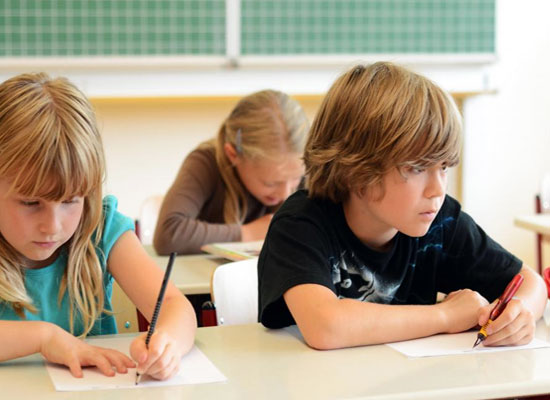What is AHAD?

Attention deficit hyperactivity disorder or ADHD is a common behavioral disorder which shows its effect on around 10% of school-age kids. In comparison to girls, boys are around three times more likely to suffer from this problem. The reason for this though is not known.
Children with ADHD start doing any work without thinking, have problem in focusing and are quite hyperactive. Though they are aware about the expectation from them but they experience problem in paying attention, sitting still and focusing on the details.
Most of the times, younger kids act in this manner mainly when they are thrilled or nervous. The symptoms of ADHD actually harm the social and academic performance of a child, be it at home or at school.
ADHD develops during childhood though with the proper treatment, children with ADHD can becomes fine by managing their symptoms and living their lives successfully.
Types and Symptoms

Signs in an inattentive type:
- Problem in paying attention to important details or an inclination towards making careless mistakes in school work or other activities
- Trouble in focusing on important tasks or while playing
- Listening problems in some cases
- Difficulty in following commands
- Difficulties with organization
- Avoiding or disliking of things that need mental energy
- Inclination towards losing things like toys, and notebooks etc.
- Getting easily distracted
- Absent-mindedness in day to day activities
Signs in a hyperactive-impulsive type:
- Fiddling or wriggling
- Trouble in remaining seated
- Unnecessary climbing or running
- Problem in playing silently
- Constantly looking ‘on the go’
- Unnecessary talking
- Giving answers before hearing the question
- Trouble in waiting in queue
- Problems in interrupting
Signs in a combined type, which is the most common one:
Though raising a child with ADHD is a challenging task, it is important to recall again and again that they are not naughty or acting out or being a problem on purpose for you. These children experience problem in controlling their behavior without behavioral therapy or medicine.
Symptoms in Adults
As a person gets older, following are the signs:
- Nervousness
- Chronic forgetfulness and lateness
- Low self-esteem
- Problem in controlling anger
- Difficulties at work
- Impulsiveness
- Disorganized
- Substance abuse or addiction
- Procrastination
- Chronic boredom
- Get easily frustrated
- Difficulty in concentrating while reading
- Depression
- Mood swings
- Problems in relationship
Risk Factors
Experts are not really sure about the reasons that cause ADHD but following can be summed up as rick factors:
- Genes
- Low weight at the time of birth
- Alcohol abuse, Cigarette smoking, or drugs during pregnancy
- Contact with environmental toxins at a younger age, like high levels of lead
- Injuries to or in brain
- Contact with environmental toxins at the time of pregnancy
This problem is found more in men then in women. Women with AHAD generally have problem in primary inattention. However, some experts say that symptoms of ADHD are harder to be spotted in females. The other problems with come along with AHAD are anxiety disorder, learning disabilities, substance abuse, depression and conduct disorder.
Diagnosis
As there is no test for the detection of ADHD, its diagnosis can be done only after a complete evaluation. Initially, children with ADHD are evaluated and then treated by family practitioners and pediatricians who might refer them to specialists like neurologist, psychologists and psychiatrists. If the primary doctors have any doubt in diagnosis or are concerned about other matters like anxiety, a learning disability, depression or Tourette syndrome, the kid is sent to a specialist.
After the following conditions, a diagnosis of ADHD need to be done:
- The child must show any of behavioral symptoms as given above before 12 years of age.
- These symptoms must be more serious in comparison to other kids of the same age.
- These behaviors must continue for at least 6 months.
- This behavior must have a negative effect in at least 2 areas of the child’s life be it home, friendship, school or childcare center.
One must take note that the behavior being shown by the child is not due to any stress that must be going on in the home such a shift from the house, changing of the school, a divorce, illness or any other important event in our life. For avoiding a misdiagnosis, it is important to take not that there is no such factor.
Firstly, the doctor does a physical examination and takes the medical history that has questions regarding symptoms such as past health of the child, the health of the overall family, any allergy that the child might have, any medication of the child that is going on, and other concerns. He might also check the vision and hearing ability.
The doctors also asks other questions such as the behavior and development of the child at home, among friends and in school. Along with the parents, other adults who come in contact with the child like the teacher might also be concerned. He might also ask a school psychologist to conduct an educational evaluation. A thorough and honest assistance is expected from all.
Causes of ADHD
The causes of ADHD are not clear as it has biological origins, which are not clear. Although no single cause can be easily recognized but the experts say that there are a few probable environmental as well as genetic connections. According to studies, a huge number of kids with ADHD had a close relative who was suffering from the same disorder.
Though the researchers are not sure that whether this a cause or not, but the found out some pf the areas of the brain were about 5 to 10 percent smaller in size and they were slower too. Chemical changes were also noticed.
Smoking during pregnancy might also results in ADHD in a child as per the researchers. Other concerns are injury to the brain, low birth weight and premature delivery.
As per some of the researches, there is also a probable connection between future attention problems and watching Television at an early age. Experts say that children below 2 years of age or slightly older must limit their TV watching time to 1 to 2 hours in a day and that too watching quality programs.
Related Problems
- Oppositional Defiant Disorder (ODD) and Conduct Disorder (CD)
- Mood disorders
- Learning disabilities
- Anxiety Disorders
Treating ADHD
There is no cure for ADHD but it can easily be managed. The doctor charts out an individual long-term plan for the care of the child, which aims at making the child control his behavior. The family is also required to create such an atmosphere where the kid can easily do so.
In most of the cases, the best to treat ADHD is with an arrangement of behavior and medicine therapy. A good plan for treatment generally includes monitoring and follow-ups by the doctor. Parent education also plays an important role in management of ADHD.
In certain cases, the signs of ADHD start reducing as the age of the person grows. Difficulties in attention and organization might continue but hyperactivity becomes less. More than half of the children with ADHD continue with the symptoms as young adults.
Medications
Medicines like Stimulants, Non-stimulants, Non-depressants are prescribed by the doctor. Different medicines have different effect on different kids. One child may respond well but the other might not. In order to know about the correct treatment, the doctor tries out some medication in different doses, especially if the child is seeking treatment for ADHD along with another disorder.
Behavioral Therapy
Studies show that when medicines for correcting attention problems and impulsive behavior work best when combined with behavioral therapy, which works towards changing the behavioral pattern of the child:
- Charting out an arrangement for negative results in the case of inappropriate behavior and rewards for appropriate one.
- Giving proper advices and instructions to the child.
- Rearranging a home and school environment of the child.
Helping your child in discover a talent, making him decide his goals and rewards, changing your interaction with the child, making him organized, disciplining him, avoiding distractions, limiting his choices and creating a routine are some of behavioral changes that need to be brought.
Alternative Treatments
Behavioral therapy and medicines by far have known to be effective ADHD treatment. However, in some cases, as per the symptoms of the child, the doctor might recommend alternative therapies and treatment. The requirement of every child is different. For instance, a child might require occupational therapy and educational assistance like tutoring.
Other alternative therapies tried and popularized by parents are diet changes, mega vitamins, attention training, allergy treatments, one-on-one talking psychotherapy, and visual training. However, this does not has any scientific backing. Other than this, parents themselves can suggest if they have something new in their mind.
ADHD in the Classroom
Parents should be aware about the medical, education and legal right of their child. Children with ADHD are eligible for special services and accommodation at school. Stay in touch with the teachers and other school officials for monitoring the progress of your child.
- You can also make a routine and chart out a reward system for your child in the class, along with his teacher:
- Avoiding seating distractions like making him sit near the teacher and not the window.
- Making a homework folder for parent-teacher communication where the teacher can put assignments and progress notes. Make sure that your kid does hi work on time.
- Ask the teacher to give clear instruction to your child.
- You can also ask the teacher to often praise your child for positive actions
- The teacher can instill good study skills such as reading loudly, making notes, underlying the important things etc.
- Take care whether the child is carrying correct books to the school or not. For this, you can also take assistance from his friend.
- You can request the teacher to give feedback to your in private, remain sensitive to his self-esteem concerns and guide him about this performance.
- You can take assistance from the school counselor who can also chart out a behavioral program.
For Adults:
A professional therapist or counselor or therapist can help an adult with ADHD in how to organize his life:
- Maintaing routines
- Making lists for different tasks
- Use of a calendar for scheduling events
- Use of reminder notes
- Having a special place for documents, keys, and bills
- Managing complex tasks by breaking them into smaller ones
Support Your Child Completely
Bringing up a child with ADHD is a challenging task for parents as they might not respond properly to typical parenting techniques. Another reason for this might be that ADHD sometimes run in the family and so parents might also have organizing problem and need assistance themselves.
According to the experts, parents can take help from support groups and parent education in accepting the diagnosis and also how to help the kid in developing problem solving skills, organizing the environment, and handling the frustration. They can also seek training on calming skills on how to manage the behavior of their kid. Family or individual counseling can also help.
Take full advantage of the education and support that is available to you so that you can help the child in best manner possible.
[ Also read on Neurosurgery in India ]
Related posts:
Guide to Schizophrenia
Home Remedies for Migraine
